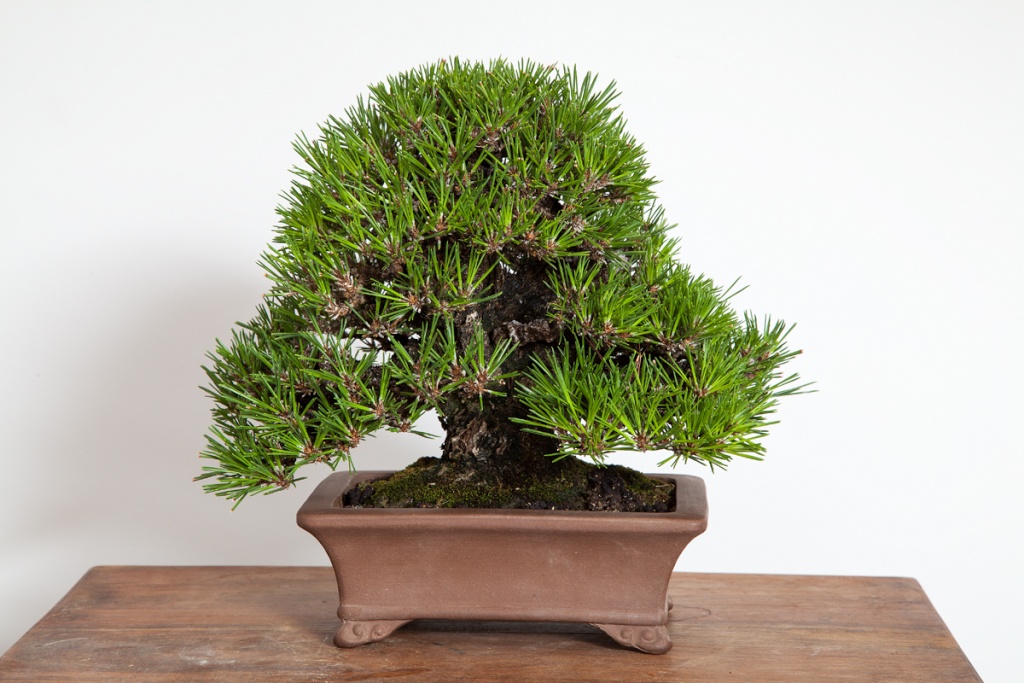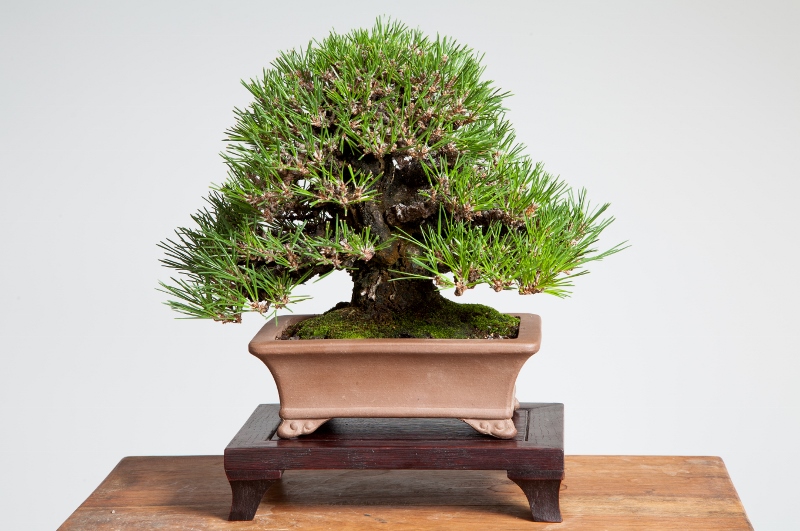Kuromatsu gan-seki-sho shohin
+8
hawthorn
Salva70
yamasuri
Leo Schordje
Brian Van Fleet
Mário Eusébio
Hans Vleugels
Pedro G C Almeida
12 posters
Page 1 of 1
 Kuromatsu gan-seki-sho shohin
Kuromatsu gan-seki-sho shohin
Hello All,
Here is the progress of a Pinus thunbergii gan-seki-sho shohin during a little over a year. This variety is a cork-bark kuromatsu with extremely compact foliage, short needles of about 1,5cm long (about 2/3 inches) and which back-budds very easily.
The tree is just below 20cm (about 8 inches) high and 24cm (about 10 inches) wide. The known history of the tree is as follows. It was bought by my Oyakata, Mr. Nobuichi Urushibata, in an auction in Yokohama during the summer of 2010. At that time, my friend Alberto Baleato from Galicia, Spain, was in Taisho-en and fell in love for the tree. Here is the tree in Taisho-en:
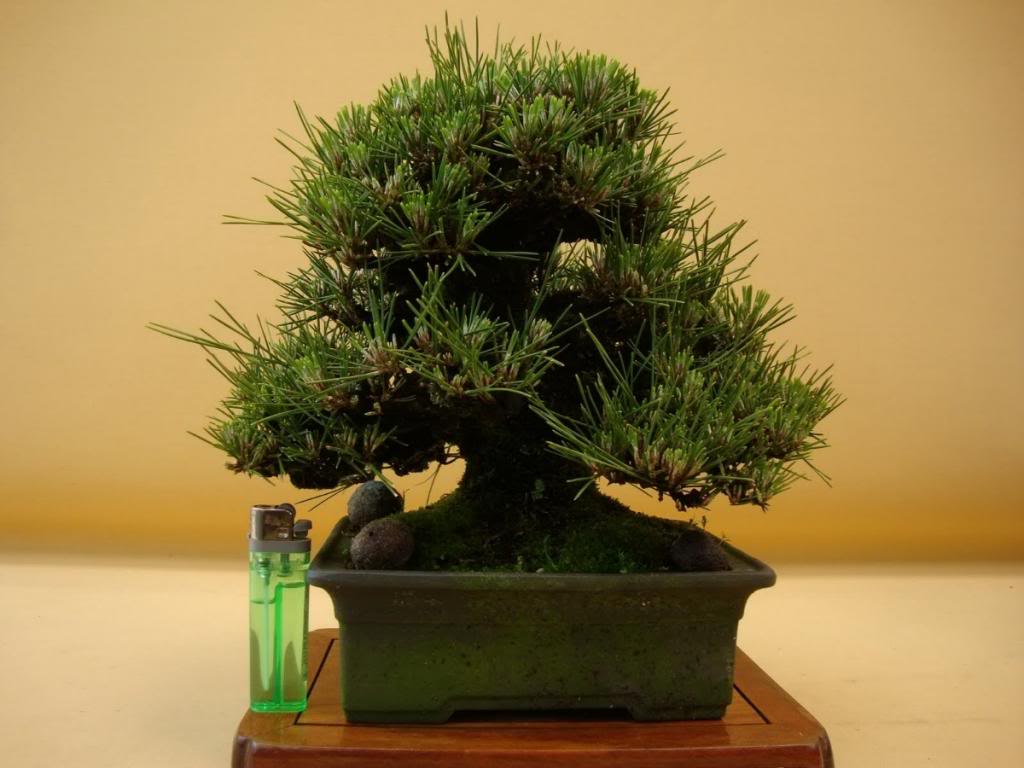
Alberto brought the tree with him into Spain. Here are some pictures in Galicia (I think just before meikiri):


Somehow, the tree found its way to my home (many thanks Alberto!) at the end of 2010. Here is how it looked like when it arrived:
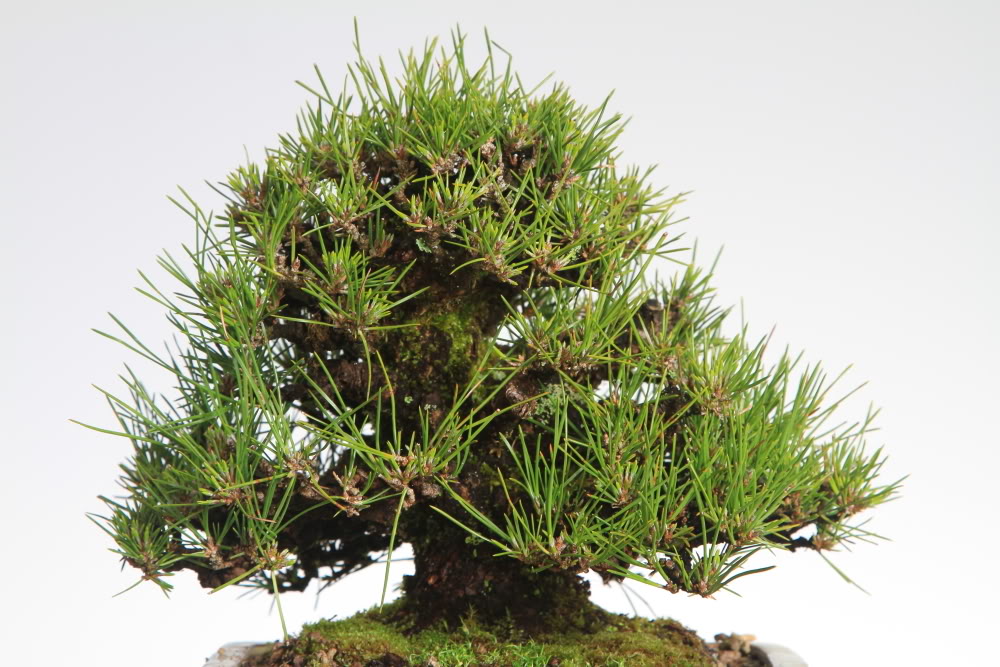
The first task was to clean up the moss from the trunk. This was done with tweezers, a solution of vinegar and lots of patience. I also did some pruning, a little wiring and I removed about 2/3 of the soil, which was very hard. The result:
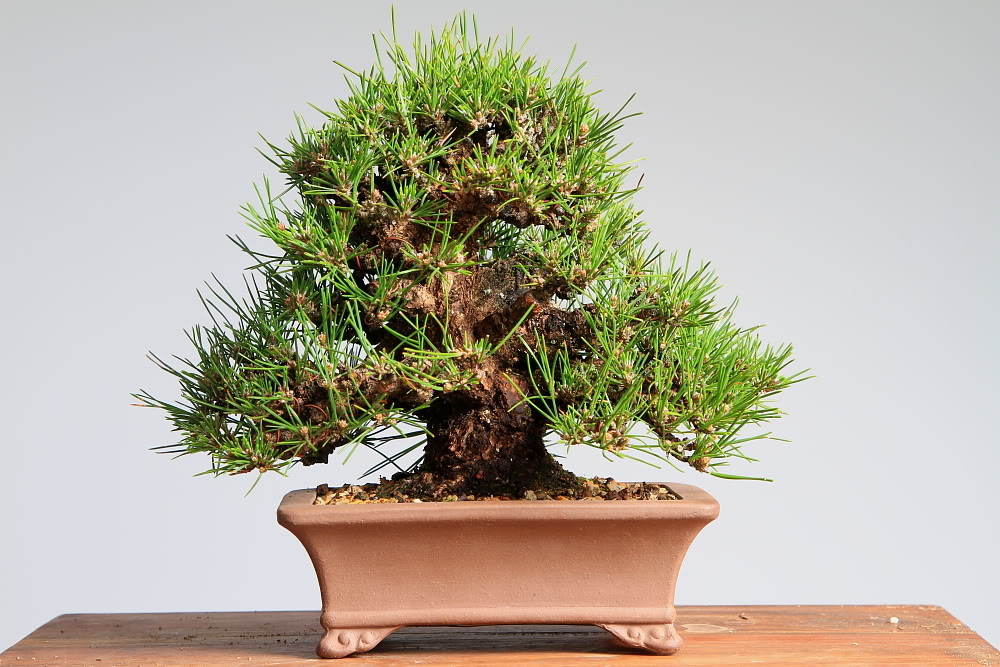
About two months later, the tree was growing vigourosly:
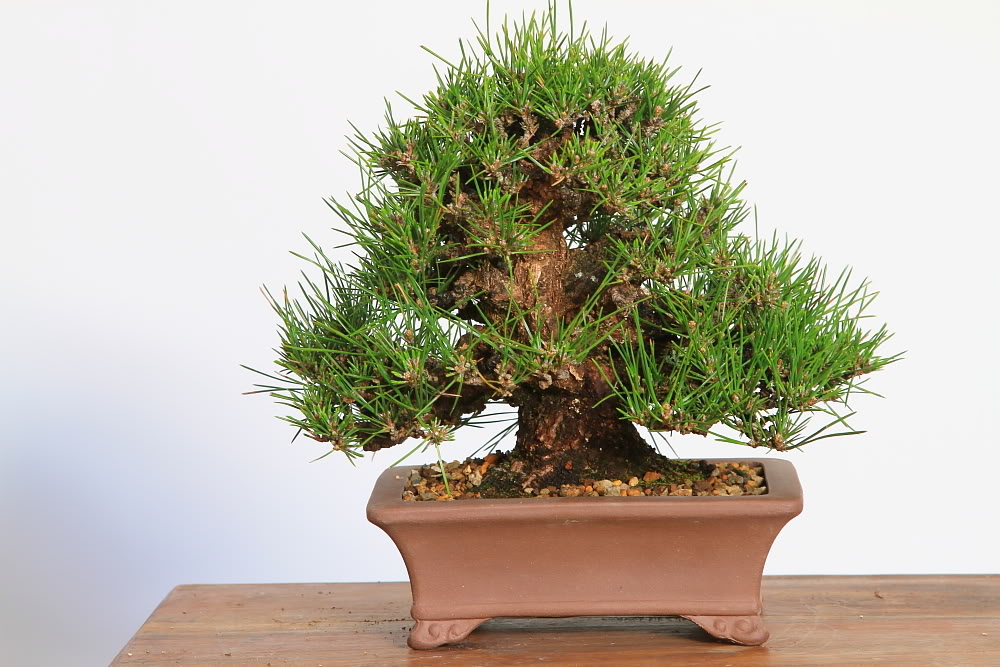
Here are some details of the trunk and first branches:
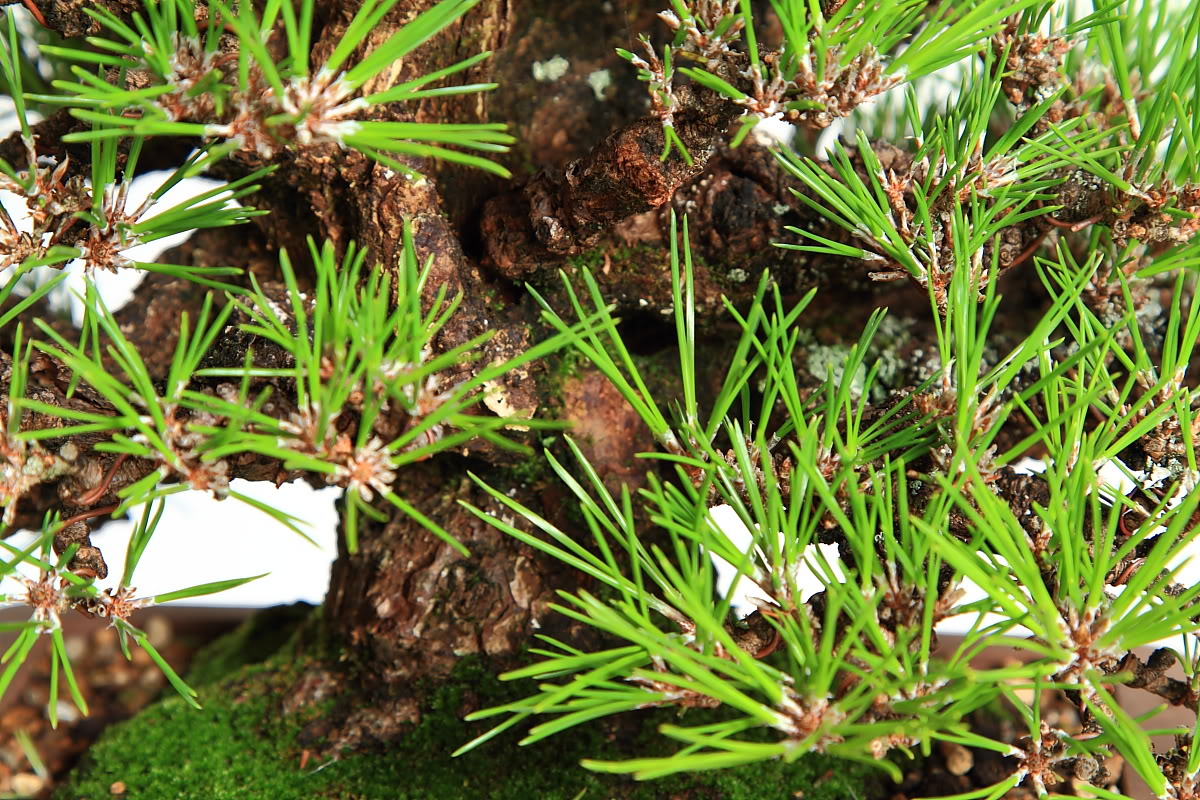
I decided that there would be no meikiri during 2011. In June the tree looked like this:

In July I removed most of the old needles:
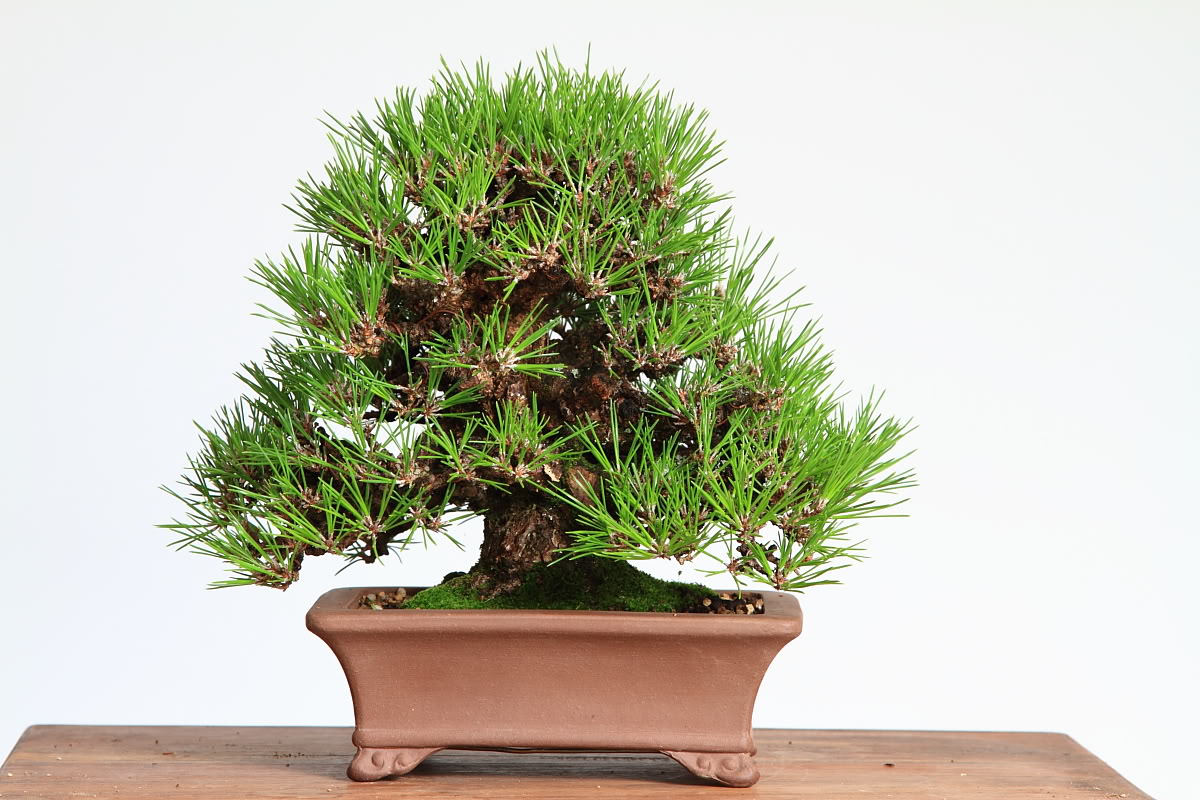
More details:

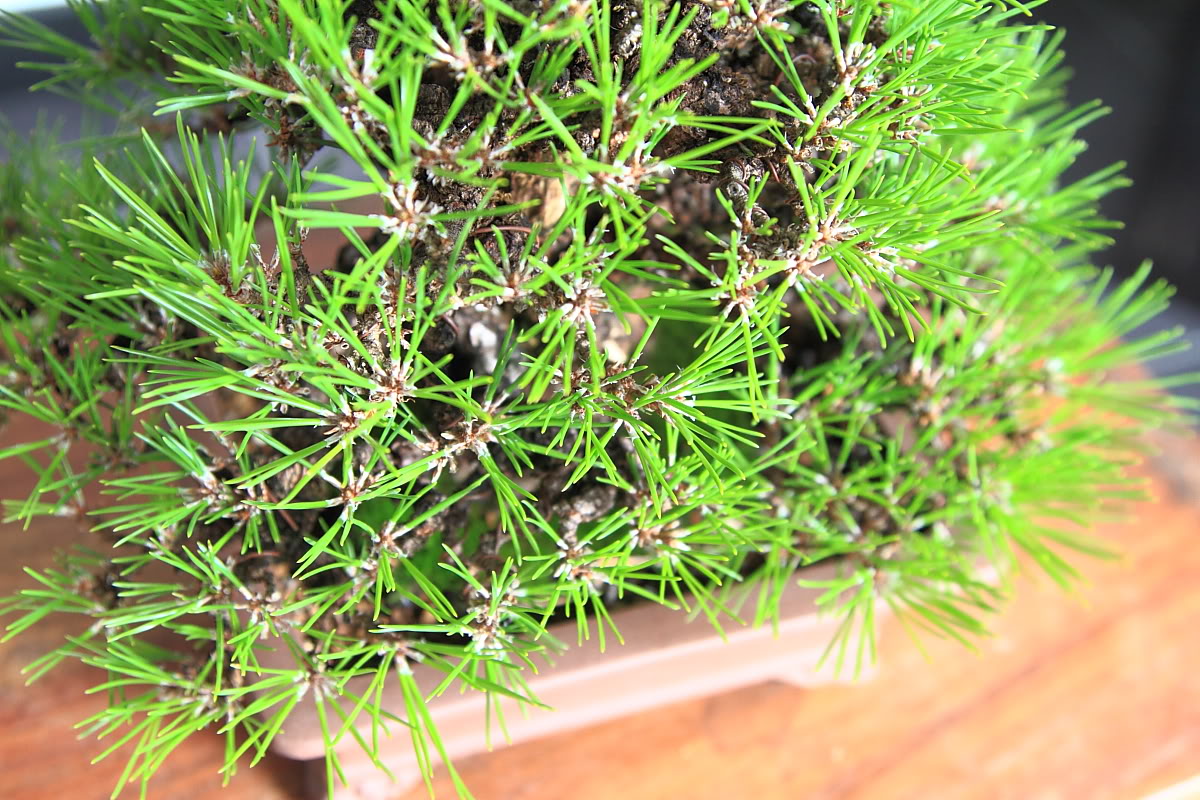
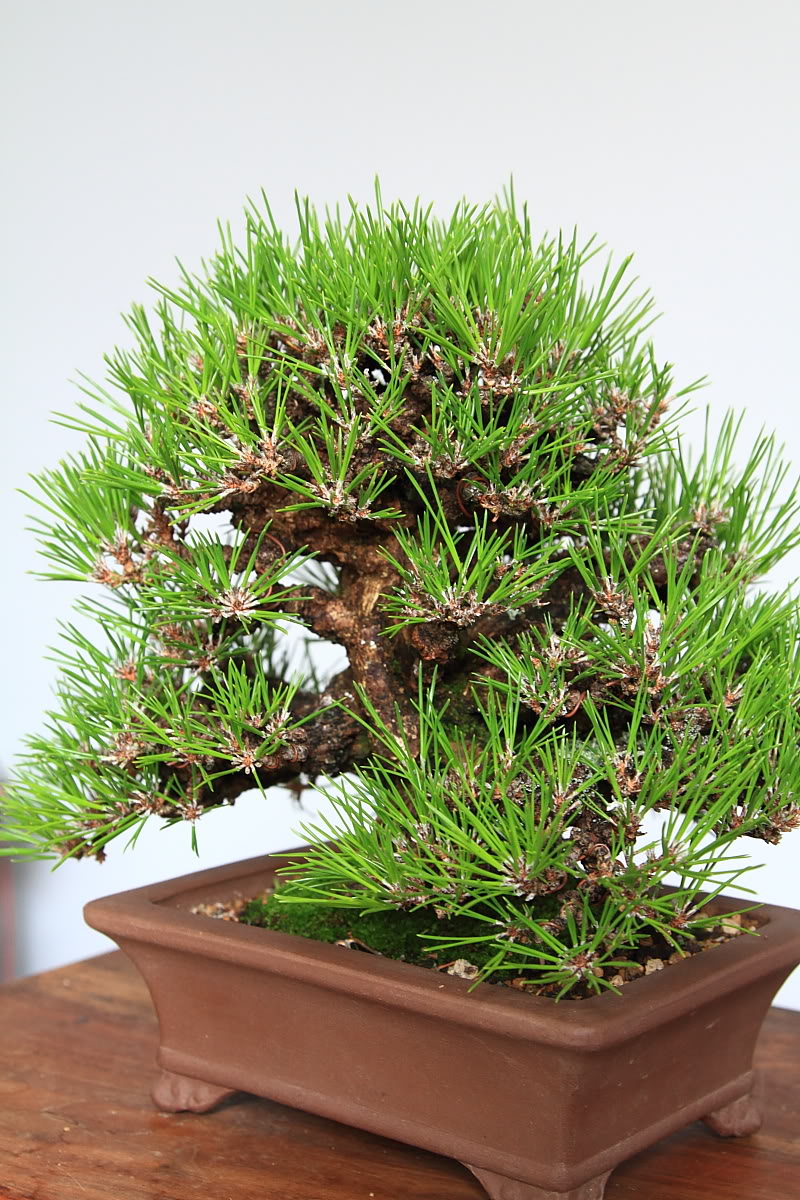
Finally, this fall I removed some of this years' needles and wired most of the branches. The tree has been heavily fed since mid-September. Here is how it looks like:

The plan is to further broaden the canopy, especially the ichi-no-eda which I belive to be the first left branch.
Any coments, suggestions or critiques will be much appreciated. Does anyone know of any tree of this variety (gan-seki-sho)? I have tried to find some other examples in the internet but had no success.
One last thing: my friend Alberto Baleato has had a number of trees stolen from his home in Galicia. You can find which trees here:
http://kingii.blogspot.com/
If you do spot any of them, please contact me via PM or Alberto through his blog. Your help is much appreciated.
Thanks for reading!
Regards,
Pedro
P.S. just in case you haven't noticed, all the photos are clickable thumbnails linked into high-resolution photos.
Here is the progress of a Pinus thunbergii gan-seki-sho shohin during a little over a year. This variety is a cork-bark kuromatsu with extremely compact foliage, short needles of about 1,5cm long (about 2/3 inches) and which back-budds very easily.
The tree is just below 20cm (about 8 inches) high and 24cm (about 10 inches) wide. The known history of the tree is as follows. It was bought by my Oyakata, Mr. Nobuichi Urushibata, in an auction in Yokohama during the summer of 2010. At that time, my friend Alberto Baleato from Galicia, Spain, was in Taisho-en and fell in love for the tree. Here is the tree in Taisho-en:

Alberto brought the tree with him into Spain. Here are some pictures in Galicia (I think just before meikiri):


Somehow, the tree found its way to my home (many thanks Alberto!) at the end of 2010. Here is how it looked like when it arrived:

The first task was to clean up the moss from the trunk. This was done with tweezers, a solution of vinegar and lots of patience. I also did some pruning, a little wiring and I removed about 2/3 of the soil, which was very hard. The result:

About two months later, the tree was growing vigourosly:

Here are some details of the trunk and first branches:

I decided that there would be no meikiri during 2011. In June the tree looked like this:

In July I removed most of the old needles:

More details:



Finally, this fall I removed some of this years' needles and wired most of the branches. The tree has been heavily fed since mid-September. Here is how it looks like:

The plan is to further broaden the canopy, especially the ichi-no-eda which I belive to be the first left branch.
Any coments, suggestions or critiques will be much appreciated. Does anyone know of any tree of this variety (gan-seki-sho)? I have tried to find some other examples in the internet but had no success.
One last thing: my friend Alberto Baleato has had a number of trees stolen from his home in Galicia. You can find which trees here:
http://kingii.blogspot.com/
If you do spot any of them, please contact me via PM or Alberto through his blog. Your help is much appreciated.
Thanks for reading!
Regards,
Pedro
P.S. just in case you haven't noticed, all the photos are clickable thumbnails linked into high-resolution photos.
Last edited by Pedro G C Almeida on Sat Aug 03, 2013 11:49 am; edited 2 times in total
Pedro G C Almeida- Member
 Re: Kuromatsu gan-seki-sho shohin
Re: Kuromatsu gan-seki-sho shohin
Hi Pedro, that is a lovely shohin pine you have there! Looking very healthy and vigorous too. Could you tell us what made you decide there would be no mekiri in 2011?
About the name Gansekisho, I found this on the net: Cork bark Japanese Black Pines were discovered in the Seto area and were originally called Gansekisho or Yahazusho. Today, they are known generically as Nishiki, Brocade, or Corticosa in the West. Gan-Seki-Sho has the overall mature appearance a stunning rough texture. Literal translation is rock pebble bark. This is an excellent variety for bonsai. Needles dwarf well and the plant produces multiple buds, which in turn develop into beautiful ramification. The bark is not as deeply fissured as most varieties, however it blends in nicely for a fine overall composition. More to read about this species on http://www.nebaribonsai.com/Nebari_Bonsai_112109/Projects_files/Cork%20Bark%20Black%20Pines%20121909.pdf
Best regards,
Hans
About the name Gansekisho, I found this on the net: Cork bark Japanese Black Pines were discovered in the Seto area and were originally called Gansekisho or Yahazusho. Today, they are known generically as Nishiki, Brocade, or Corticosa in the West. Gan-Seki-Sho has the overall mature appearance a stunning rough texture. Literal translation is rock pebble bark. This is an excellent variety for bonsai. Needles dwarf well and the plant produces multiple buds, which in turn develop into beautiful ramification. The bark is not as deeply fissured as most varieties, however it blends in nicely for a fine overall composition. More to read about this species on http://www.nebaribonsai.com/Nebari_Bonsai_112109/Projects_files/Cork%20Bark%20Black%20Pines%20121909.pdf
Best regards,
Hans

Hans Vleugels- Member
 Re: Kuromatsu gan-seki-sho shohin
Re: Kuromatsu gan-seki-sho shohin
Hi Hans,
Many thanks for your coments and for the info on the gan-seki-sho pines.
I suppose it was sort of a gut feeling. I repoted the tree and it had just arrived at my place (which is Madeira island, USDA zone 11 - temperatures don't drop below 10ºC nor do they rise above 28ºC)... I thought it would be safer to just let it grow freely during this season to adapt to the new conditions and recover from the removal of the old soil. In that operation the tree lost a lot of feeder roots and halted growth during about two months. Maybe going for meikiri a few months later would have been too much of an insult for this pine and I did not want to risk it.
The pdf document you indicated was the only thing I have found on the internet about gan-seki-sho pines. I have never seen other specimens of this type of kuromatsu. If anyone knows anything about them or has seen other specimens, then please reply.
Cheers,
Pedro
Many thanks for your coments and for the info on the gan-seki-sho pines.
Could you tell us what made you decide there would be no mekiri in 2011?
I suppose it was sort of a gut feeling. I repoted the tree and it had just arrived at my place (which is Madeira island, USDA zone 11 - temperatures don't drop below 10ºC nor do they rise above 28ºC)... I thought it would be safer to just let it grow freely during this season to adapt to the new conditions and recover from the removal of the old soil. In that operation the tree lost a lot of feeder roots and halted growth during about two months. Maybe going for meikiri a few months later would have been too much of an insult for this pine and I did not want to risk it.
The pdf document you indicated was the only thing I have found on the internet about gan-seki-sho pines. I have never seen other specimens of this type of kuromatsu. If anyone knows anything about them or has seen other specimens, then please reply.
Cheers,
Pedro
Pedro G C Almeida- Member
 Re: Kuromatsu gan-seki-sho shohin
Re: Kuromatsu gan-seki-sho shohin
Very nice and classic Shohin-bonsai. Good work too keeping needles short. Can be difficult at JBP.
Regards
Morten
Regards
Morten
Guest- Guest
 Re: Kuromatsu gan-seki-sho shohin
Re: Kuromatsu gan-seki-sho shohin
Hi Morten,
Many thanks for your input. The needles turned out to be shorter than I expected. Since there was no meikiri I tried to control the needle size through fertilizing (or lack of it during the summer), watering, and by removing old needles as soon as this year's needles started to mature (in July).
Regards,
Pedro
Many thanks for your input. The needles turned out to be shorter than I expected. Since there was no meikiri I tried to control the needle size through fertilizing (or lack of it during the summer), watering, and by removing old needles as soon as this year's needles started to mature (in July).
Regards,
Pedro
Pedro G C Almeida- Member
 Re: Kuromatsu gan-seki-sho shohin
Re: Kuromatsu gan-seki-sho shohin
Hi Pedro!
As Morten said, that's a very good and classical JBP shohin! Congratulations!!!
Considering Your clima, You did a very good job with needle's redution. In very short time the tree had developed very well!
Best regards,
Mário Eusébio
As Morten said, that's a very good and classical JBP shohin! Congratulations!!!
Considering Your clima, You did a very good job with needle's redution. In very short time the tree had developed very well!
Best regards,
Mário Eusébio
Mário Eusébio- Member
 Re: Kuromatsu gan-seki-sho shohin
Re: Kuromatsu gan-seki-sho shohin
Mário,
How nice it is to see you here!
Thanks for your encouragement. I am really looking forward to seeing how will the tree react to meikiri next year.
Anyone has any info on gan-seki-sho japanese black pines or know a bonsai specimen of this variety?
Cheers,
Pedro
How nice it is to see you here!
Thanks for your encouragement. I am really looking forward to seeing how will the tree react to meikiri next year.
Anyone has any info on gan-seki-sho japanese black pines or know a bonsai specimen of this variety?
Cheers,
Pedro
Pedro G C Almeida- Member
 Re: Kuromatsu gan-seki-sho shohin
Re: Kuromatsu gan-seki-sho shohin
Greetings,
The PDF file referenced in this thread is one I compiled a couple years ago from numerous experts and annotated sources; including Bonsai Today, International Bonsai, Dave DeWire, Steve Pilacik, Bill Valavanis, and Brent Walston. I'm only aware of one grower here in the US who sold Ganseki-sho; Dave DeWire. Here is his description from that PDF:
Gan-Seki-Sho bark has the overall mature appearance [of] a stunning rough texture; deeply fissured like Kyokko Yatsabusa. Literal translation is rock pebble bark. The cork on GSSY tends to start and grow on the trunk below the branch nodes then fills in between the nodes the following year. Mature bark is achieved in fifteen to twenty years, depending on growing conditions and cultivation. Needles reduce down to an inch in length. Multiple buds appear at every node allowing for excellent branch selection and formation. This variety will also bud up in spaces between branch whorls making for interesting designs.
Literally translated: Ganseki = Rock Sho = many/various. I don't have any photographs other than the ones in that file, and don't presently have one growing. Yours is a very nice tree, and seems to be very happy in your care; congratulations!
Regards,
Brian
http://nebaribonsai.wordpress.com/
www.nebaribonsai.com
The PDF file referenced in this thread is one I compiled a couple years ago from numerous experts and annotated sources; including Bonsai Today, International Bonsai, Dave DeWire, Steve Pilacik, Bill Valavanis, and Brent Walston. I'm only aware of one grower here in the US who sold Ganseki-sho; Dave DeWire. Here is his description from that PDF:
Gan-Seki-Sho bark has the overall mature appearance [of] a stunning rough texture; deeply fissured like Kyokko Yatsabusa. Literal translation is rock pebble bark. The cork on GSSY tends to start and grow on the trunk below the branch nodes then fills in between the nodes the following year. Mature bark is achieved in fifteen to twenty years, depending on growing conditions and cultivation. Needles reduce down to an inch in length. Multiple buds appear at every node allowing for excellent branch selection and formation. This variety will also bud up in spaces between branch whorls making for interesting designs.
Literally translated: Ganseki = Rock Sho = many/various. I don't have any photographs other than the ones in that file, and don't presently have one growing. Yours is a very nice tree, and seems to be very happy in your care; congratulations!
Regards,
Brian
http://nebaribonsai.wordpress.com/
www.nebaribonsai.com
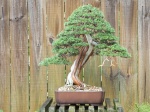
Brian Van Fleet- Member
 Re: Kuromatsu gan-seki-sho shohin
Re: Kuromatsu gan-seki-sho shohin
Last edited by Pedro G C Almeida on Thu Aug 01, 2013 4:44 pm; edited 1 time in total
Pedro G C Almeida- Member
 Re: Kuromatsu gan-seki-sho shohin
Re: Kuromatsu gan-seki-sho shohin
The tree es fantastic.
Only one thing, open de apex to a better viewing of trunk.
Only one thing, open de apex to a better viewing of trunk.

Salva70- Member
 Re: Kuromatsu gan-seki-sho shohin
Re: Kuromatsu gan-seki-sho shohin
Hi Fiona. The best account of meikiri I know of online is this post by Peter Tea: http://peterteabonsai.wordpress.com/2012/06/29/de-candling-and-stuff/
Pedro G C Almeida- Member
 Re: Kuromatsu gan-seki-sho shohin
Re: Kuromatsu gan-seki-sho shohin
Actually, I'll have to take that back. This video by Bjorn Bjorholm & the guys at Kouka-en is at least as good as Peter's post in explaining the technique. I'm pretty sure that many people in this forum know the video already, but here's a link anyway:
https://www.youtube.com/watch?v=IIB8nGANvok
I strongly recommend watching the whole series for that matter! Highly instructive and also entertaining material.
https://www.youtube.com/watch?v=IIB8nGANvok
I strongly recommend watching the whole series for that matter! Highly instructive and also entertaining material.
Pedro G C Almeida- Member
 Gan-Seki-Sho
Gan-Seki-Sho
Hello all,
Brent at evergreengardenworks say the needle are very long about 6"
I bought one today.
Brent at evergreengardenworks say the needle are very long about 6"
I bought one today.
Peterthinh- Member
 Re: Kuromatsu gan-seki-sho shohin
Re: Kuromatsu gan-seki-sho shohin
What is so difficult about saying that it is a process of removing candles on JBP and JRP? Or as usual, lately---- Am I wrong? I appreciate the links, I really do, but I think sometimes we think we increase our status by using terms no one else is familiar with. Then after being questioned we still don't answer directly but instead; post the links explaining the process.
But still; we don't come out and simplify the explanation by saying what it is. How long did it take us to explain Yamadori? Of course there is the alternate explanation, I don't know what I am talking about. Then still; I don't understand what meikiri is. Would someone be so kind as to inform me that my simpleton explanation above is totally wrong and correct me, I would hate to wallow in a sea of ignorance.
But still; we don't come out and simplify the explanation by saying what it is. How long did it take us to explain Yamadori? Of course there is the alternate explanation, I don't know what I am talking about. Then still; I don't understand what meikiri is. Would someone be so kind as to inform me that my simpleton explanation above is totally wrong and correct me, I would hate to wallow in a sea of ignorance.
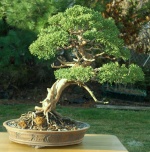
Vance Wood- Member
 Re: Kuromatsu gan-seki-sho shohin
Re: Kuromatsu gan-seki-sho shohin
Pedro, this is a beautiful tree. I love seeing its progression. Thank you.
I'm looking forward to more photos of this tree in the future.
I'm looking forward to more photos of this tree in the future.

Leo Schordje- Member
 Re: Kuromatsu gan-seki-sho shohin
Re: Kuromatsu gan-seki-sho shohin
Leo Schordje wrote:Pedro, this is a beautiful tree. I love seeing its progression. Thank you.
I'm looking forward to more photos of this tree in the future.
+1

Rui Marques- Member
Page 1 of 1
Permissions in this forum:
You cannot reply to topics in this forum







